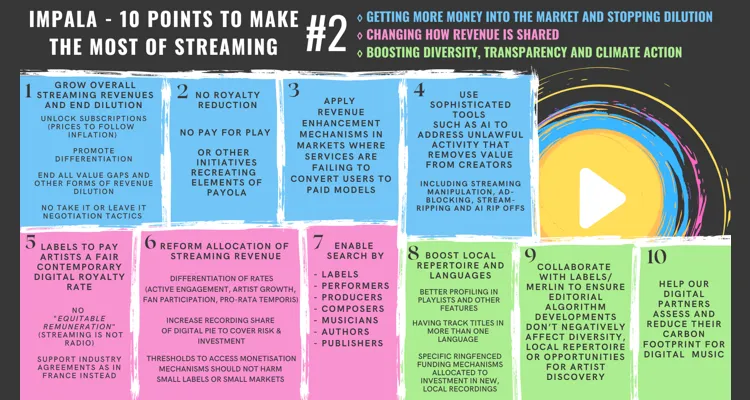IMPALA calls for increased subscription prices, bespoke deals for fans, and a higher share for master rights, among other proposals for streaming reform.
After a month-long review process beginning on the second anniversary of IMPALA Music‘s ten-point streaming plan, the independent sector has issued a new call to action that builds on IMPALA’s initial recommendations for a fairer and more dynamic streaming market.
In a proposal to provide a more compelling and responsible streaming future for creators and fans, IMPALA’s latest call to action focuses on three key themes:
- Getting more money into the market and making sure there is no dilution of revenues
- Changing how revenue is shared
- Boosting diversity, transparency, and climate action
Streaming has remained the center of many insistent calls for reform in the two years since IMPALA published its initial plan. Many recent proposals from different parts of the market also echo that initial analysis.
IMPALA’s proposals lead with an amplified call to grow the overall market, including increasing subscription prices, ramping up the conversion from “freemium,” and addressing revenue dilution.
“We need to increase the economic value of music as a priority and reset the conditions in terms of allocation models. That is how we can grow a fair and diverse market,” says Mark Kitcatt, co-owner and MD of Everlasting Popstock, IMPALA’s President and Chair of IMPALA’s streaming working group.
“Start with adjusting the basic offer to reflect the pressures of inflation, and then move on up. No two music fans share the exact same passions and needs — the possibilities of tailored subscriptions are endless. But concentration in the streaming market means that the efforts of the small number of multinational companies (that) dominate that market are limited to making the same model ever-cheaper. Fans and artists deserve much more.”
Central to the debate has been the question of how remuneration is shared. With market studies showing an overall decline in label share, IMPALA’s revised plan includes a clear call to see this increase. This call to action is alongside repeated calls on labels to pay a modernized digital royalty rate while opposing calls for so-called equitable remuneration.
IMPALA’s recommendations also emphasize the need to apply new models to allocating revenue, including the AIM artist growth model and proposals based on how active fans are and opportunities to maximize revenue depending on fan participation.
“All artists should receive a fair contemporary digital rate, regardless of the decade in which they signed their record deal,” Kitcatt continued. “It’s simply unarguable and is crucial as regular crises force us to reduce our reliance on touring. Services must also play their part; we cannot support initiatives that decrease royalties, whether for preferential algorithmic treatment or any other reason.”
“When it comes to so-called equitable remuneration, we continued our research and our view on this has not changed,” adds IMPALA’s Executive Chair Helen Smith. “It would deplete value from the market and undermine diversity, equity, and inclusion in the music community. Instead, we believe industry-wide agreements exemplified in France are the way forward.”
“We also address the discussion about shares between different parts of the sector and believe that we need to respond to a gradual erosion of the share going to labels,” Smith continues. “Our recommendation is that this needs to be increased to facilitate investment and risk. Not only that, but we also believe that the independent sector’s disproportionate investment in new talent needs to be recognized. No independent label should receive lower rates, and our recommendations would help increase their revenue.”
The third part of the plan sets out proposals designed to boost diversity and transparency and enhance climate engagement, all of which IMPALA lists as opportunities. Its conclusion calls for new metrics and targets.
“In another two years’ time, we hope to be celebrating a much bigger streaming industry that’s fairer for all and sets standards for delivering art in all its thrilling diversity to an engaged, informed worldwide audience choosing from tailored services for every taste and need,” concludes IMPALA.


